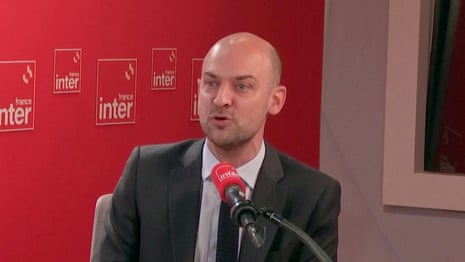Denmark has said it is open to dialogue with Donald Trump about his legitimate security concerns after the incoming US president said he was prepared to use economic tariffs or military force to seize control of Danish-administered Greenland.
Lars Løkke Rasmussen, the experienced Danish foreign minister, insisted he did not see a political crisis, but said it was in everyone’s interests to lower the temperature in the discussions.
“We are open to a dialogue with the Americans on how we can possibly cooperate even more closely than we do to ensure that the American ambitions are fulfilled.”
He added: “I have my own issues with Donald Trump and I also know that you shouldn’t say everything you think out loud.”
But he played down the possibility that Greenland would ever become part of the US: “We fully recognise that Greenland has its own ambitions. If they materialise, Greenland will become independent, though hardly with an ambition to become a federal state in the United States.”
At the same time he praised the French foreign minister, Jean-Noël Barrot, who told France Inter radio: “There is no question of the EU letting other nations in the world, whoever they may be, attack its sovereign borders.”
Barrot added that, while he did not believe the US “would invade” Greenland, “we have entered an era that is seeing the return of the law of the strongest”.
In Berlin, Steffen Hebestreit, the German government spokesperson, said in response to Trump’s remarks that “as always, the firm principle applies … that borders must not be moved by force”.
Denmark is caught in a double bind confronted by the increasingly serious threats from Trump to take over the island for US geostrategic reasons, but also growing demands from Greenland’s political class for full independence from Denmark.
In his new year remarks, Greenland’s prime minister, Múte B Egede, said that Greenland was now ready to take the next big step in the effort to break the “chains of colonialism”. A self-government act has already been passed that opens the way to a referendum on independence but the likelihood that the great powers Russia, the US and China, which are circling Greenland’s strategic importance and critical minerals, would not object to the country and its 56,000-strong population gaining full independence seems unlikely.
Local elections are due to be held in April that could turn into a test of opinion on Greenland’s constitutional future.
The president-elect’s son, Donald Trump Jr, flew briefly to Greenland on Tuesday in a trip coinciding with his father’s call for the US to run Greenland, and returned trying to stoke a mood for it to be sold to Washington.
He said: “These are people who feel they’ve been exploited. They haven’t been treated fairly by Denmark. They’re being held back from exploiting their natural resources, whether it’s coal, uranium, rare earths, gold or diamonds. It’s really a great place”.
The Danish prime minister, Mette Frederiksen, did not rule out independence, saying:“If Greenland, at some point, makes a decision of some character, then we will address that as the Danish government.” Referencing Greenland’s status within the Danish kingdom, she urged calm adding: “I don’t doubt for a second that we’re stronger together.”
She said :”There is a lot of support among the people of Greenland that Greenland is not for sale and will not be in the future either”.
In 2019 she had called Trump’s demand that Greenland was put for sale “absurd”, but there has been a collective decision by Danish government to try to soothe emotions.
Greenland was a Danish colony until 1953 but is now a self-governing territory of Denmark and in 2009 achieved the right to claim independence through a vote.
Danish politicians are hoping a confrontation can be avoided by a meeting between senior officials from Denmark and the US to discuss any update required to the many post second world war security agreements signed by the two countries. The US has a military base in Greenland, Pituffik space base (formerly Thule base) first established in 1941. It provides critical early warning systems necessary to monitor Russian activity. Other bases were abandoned in the 1970s. But with the melting of the ice around Greenland, the possibility of new trade routes opening has transformed the Arctic’s importance.
Denmark has increased its Nato spend to more than 2 % of GDP and in per capita terms is one of the largest EU contributors to Ukraine.
In an hour-long press conference on Tuesday, Trump refused to rule out using military force to take the Panama canal and Greenland and also suggested he intended to use “economic force” to make Canada part of the US.
Greenland is the world’s biggest island. Since 2009 it has had the right to hold a referendum to decide whether it wishes to be independent. Egede, a member of the pro-independence Community of the People (IA) party, said last week Greenland “is not for sale and will never be for sale”.
Egede was scheduled to meet the Danish king on Wednesday at 2pm Danish time (1pm GMT) and it was expected that Trump’s threats and advances on Greenland will be discussed.
Arriving at Copenhagen airport late on Tuesday night, Egede responded to Trump’s refusal to rule out military or economic coercion in order to gain control of Greenland, saying they were “serious statements”.
“The things that have come out, I think, are some serious statements. But we’ll take it from there,” he told the Danish broadcaster DR.
His original meeting with the king, scheduled for earlier in the day, was cancelled at the last minute, with Egede’s office citing “diary gymnastics”. But Donald Trump Jr’s visit to Greenland on Tuesday led to the cancellation being viewed by some as a snub and embarrassment to the king, who recently changed the royal coat of arms to more prominently include symbols of Greenland and the Faroe Islands, which are both autonomous territories of Denmark.
Aki-Matilda Høegh-Dam, the Greenlandic MP who represents the Siumut party in the Danish parliament, told the Guardian she took Trump’s comments about coercion as “directed more toward Panama than Greenland”. But, she said, his comments “underscore the growing geopolitical importance of Greenland”.
She added: “It also highlights a critical need for constructive dialogue. While I do not interpret his remarks as a threat of military force against Greenland or Denmark, they do suggest the United States may feel compelled to act if the Kingdom of Denmark is unable to address security concerns effectively.”







